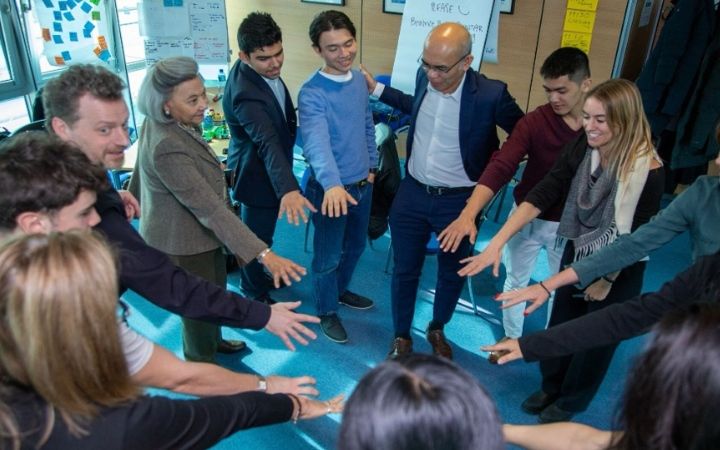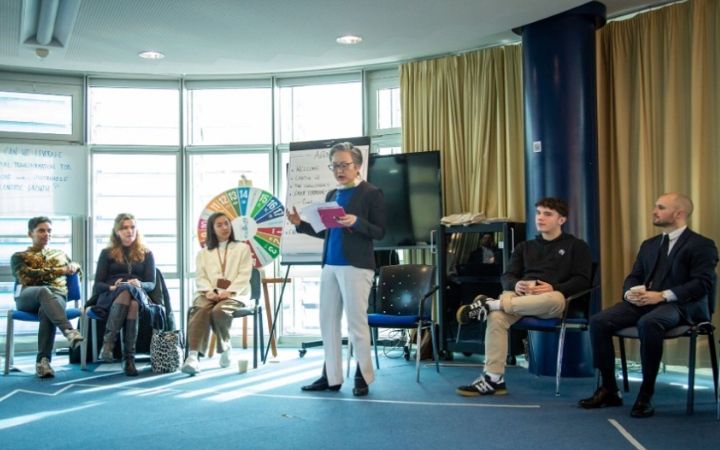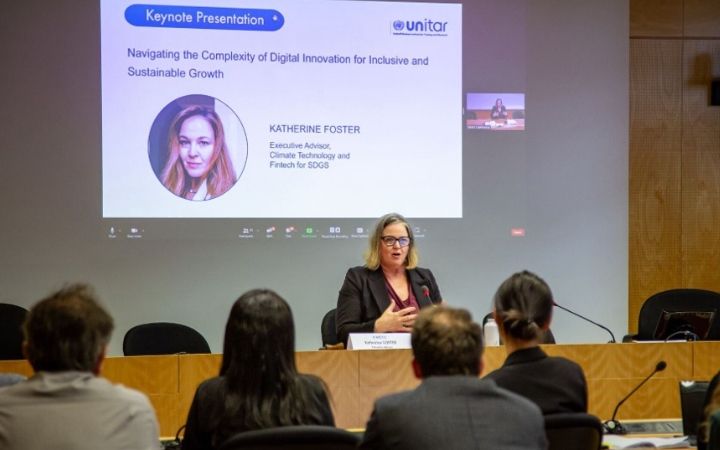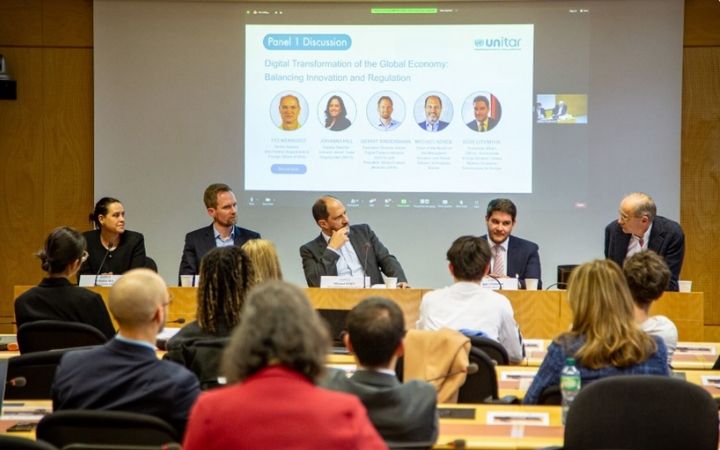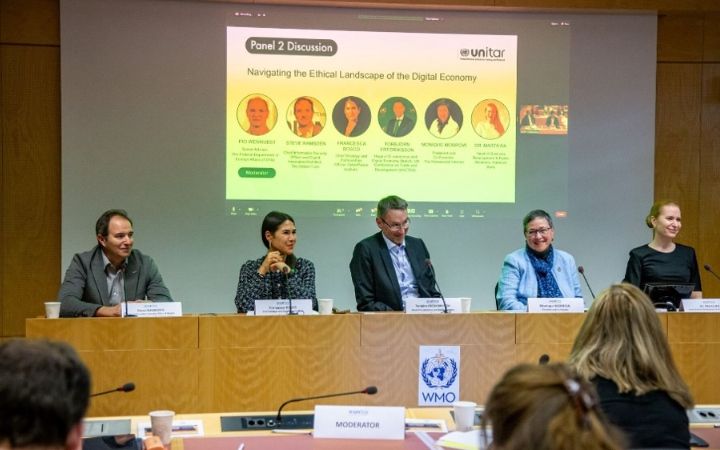- On 15 and 16 February 2024, UNITAR hosted a hackathon and conference “Leveraging the Digital Economy for Inclusive and Sustainable Economic Growth: Strategies to Overcome Risks and Harness Opportunities”.
- The hackathon and conference aimed to inspire attendees to act and address opportunities and challenges in the digital economy.
- The event brought together individuals and organizations to foster collaboration and initiate important discussions on addressing opportunities and challenges in the digital economy.
17 April 2024, Geneva, Switzerland – On 15 and 16 February 2024, UNITAR hosted a hackathon and conference “Leveraging the Digital Economy for Inclusive and Sustainable Economic Growth: Strategies to Overcome Risks and Harness Opportunities”. The event brought together nearly 270 people (43 in person and 222 online) to foster collaboration and inspire action to address the opportunities and challenges in the digital economy.
Over the last decade, the digital economy has mushroomed. It makes a significant impact on the real economy, reflecting both what is good and bad in the world economy. Its rapid evolution, scale and impact continue to challenge us, requiring us to deploy new technologies responsibly and ethically so that they feed into sustainable development.
Against this backdrop, the UNITAR Digital Finance hackathon and conference brought together digital technology innovators, young people, regulators, experts and practitioners from the financial sector to explore how we can engage the digital economy for inclusive and sustainable development.
DIGITAL FINANCE HACKATHON
The event opened with a 1.5-day hackathon, which pursued the overarching question: How can we leverage digital transformation for inclusive and sustainable economic growth? Participants were organized into teams and were guided through challenge discovery, ideation, prototyping and proof of concept, which called upon them to use their creativity and problem-solving skills to develop solutions for specific challenges. Each team then prepared a pitch for their solution to present to the following conference.
Many of the hackathon participants were young people, and their engagement was welcomed as a positive outcome.
DIGITAL FINANCE CONFERENCE
The conference was held on February 16, following the hackathon. UNITAR Division for Prosperity Director Ms Mihoko Kumamoto opened the conference by highlighting the impact that digital finance can have on our future economy. She underscored the need to address inequalities, mitigate environmental degradation and uphold the principles of social justice and fairness.
The hackathon facilitator Mr. David Winter next shared some key outcomes from the hackathon. He touched upon the importance of engaging youth in digital finance and the digital economy, a message that was echoed in many of the solutions presented by the hackathon groups.
The conference continued with a keynote presentation and dynamic panel discussions with speakers from the private sector, international organizations and academia, who spoke about regulation, innovation and development.
Keynote Presentation – Navigating the Complexity of Digital Innovation for Inclusive and Sustainable Growth
In her keynote presentation, Ms. Katherine Foster, Executive Advisor for Climate Technology and Fintech for SDGs, delved into digital innovation, inclusivity and sustainability. She spoke about moving to a more nuanced understanding of innovation that acknowledges the multifaceted and interconnected nature of digital transformation.
We’re shifting our focus from viewing digital innovation in isolation to understanding it within the broader systemic dynamics. It offers a framework for exploring that interconnectedness that we’re seeing – the technological, the social, the cultural, the linguistic, the geographic, the environmental.” —Ms. Katherine Foster, Executive Advisor, Executive Advisor for Climate Technology and Fintech for SDGs
Panel 1 – Digital Transformation of the Global Economy: Balancing Innovation and Regulation
The first panel explored the impact of digital transformation and how to balance fostering innovation and upholding financial stability, security and fairness, with special attention to the role of regulation. Speakers responded to the following questions:
- In what ways do you see digital finance and emerging technologies influencing sustainable development?
- What challenges and opportunities does the evolving nature of the digital economy present for regulatory frameworks?
- How can regulators encourage digital innovation while maintaining the necessary oversight to prevent security risks and foster a stable financial environment?
The speakers agreed that regulating digital technologies was necessary but doing so without stifling innovation was a delicate balance to find.
If we come up with regulations too early, we kill the innovation. And if we come up with regulations too late, it’s useless. Because meanwhile, things already happened.” – Mr. Pio Wennubst, Senior Advisor to the Federal Department of Foreign Affairs, Switzerland
Moderator
- Mr. Pio Wennubst, Senior Advisor to the Federal Department of Foreign Affairs, Switzerland.
Speakers
- Ms. Johanna Hill, Deputy Director-General, World Trade Organization
- Mr. Gerrit Sindermann, Executive Director, Green Digital Finance Alliance and President, Green Fintech Network
- Mr. Michael Kende, Chair of the Board of the Datasphere Initiative and Senior Advisor at Analysys Mason
- Mr. Igor Litvinyuk, Economic Affairs Officer, Sustainable Energy Division, United Nations Economic Commission for Europe
Panel 2 – Navigating the Ethical Landscape of the Digital Economy
The second panel focused on how we can foster a responsible and trustworthy digital economy that benefits all, with particular attention to the impact of digital finance on inclusion and accessibility. The speakers responded to the following questions:
- What are the ethical considerations associated with digital finance, and how can we proactively address them?
- How can we ensure that advancements in digital finance benefit all and do not perpetuate existing inequalities?
- What do you see as the most important considerations when creating policies and regulations to promote a responsible digital economy?
To ensure that digital technologies are used for the common good, collaboration between industry, government and civil society is crucial.
Just because it's human doesn't mean it's good. Just because it's technology doesn't mean it's good either.” – Ms. Monique Morrow, President and Co-Founder, The Humanized Internet
I believe technology should be built for humanity and humanity should always be at the centre. So digitalization is the way forward and democratization in finance is the solution for it. We need to bridge this gap between the humans and digitalization.” – Dr. Marta Ra, Head of Business Development & Public Relations, Radicant Bank
Speakers
- Ms. Francesca Bosco, Chief Strategy and Partnerships Officer, CyberPeace Institute
- Mr. Torbjörn Fredriksson, Head of E-commerce and Digital Economy Branch, United Nations Conference on Trade and Development
- Ms. Monique Morrow, President and Co-Founder, The Humanized Internet
- Dr. Marta Ra, Head of Business Development & Public Relations, Radicant Bank
- Mr. Steve Ramsden, Chief Information Security Officer and Digital Innovation/Architect, The Global Fund
The hackathon and conference allowed attendees to engage with one another, aligning with the event's goal of fostering partnerships and collaboration. Many of these important discussions continued to the reception following the conference.
ABOUT UNITAR
The United Nations Institute for Training and Research (UNITAR) is a dedicated training arm of the United Nations. In 2022, UNITAR trained over 395,000 learners around the world to support their actions for a better future. In addition to our headquarters in Geneva, we have offices in Hiroshima, New York and Bonn and networks around the world.
The Division for Prosperity is based in the Hiroshima Office and Geneva. We seek to shape an inclusive, sustainable and prosperous world through world-class learning and knowledge-sharing services on entrepreneurship, leadership, finance and trade, digital technologies, and nuclear disarmament and non-proliferation. We empower individuals from least-developed countries, countries emerging from conflict, and small-island developing states – especially women and young people – to bring about positive change.


